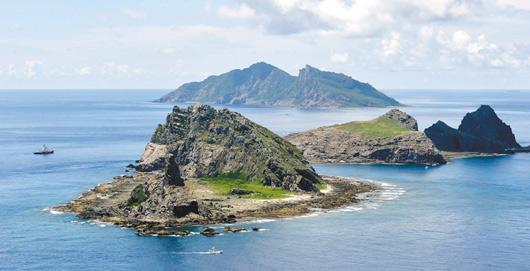
As a manager acceptable to all members of the global community, Taiwan could define the sea around the islands as an international marine reserve and such an arrangement could be a model for peace in East Asia. (▲ Diaoyutai Islands / Associated Press)
Recently, territorial disputes, such as the spat between South Korea and Japan over the Liancourt rocks — known as Dokdo in Korea and Takeshima in Japan — and the stand-off between Taiwan, China and Japan over the Diaoyutai Islands (釣魚台) — known in Japan as the Senkakus — have escalated. Countries surrounding the South China Sea have also been making overtures in relation to islands and shoals that they all claim as their territory.
What all these disputes share in common is that they are all seen from the standpoint of continental peoples, those who view the sea as belonging to the land. The idea is if a country gains control over greater numbers of islands then it can access more of the marine resources they offer. However, it would be better for Taiwan if it started out from the standpoint of a maritime people by proposing the progressive and peaceful notion that islands belong to the sea. Such an approach would be an effective safeguard for Taiwan’s security.
The 2009 ecological film Home contains a speech attributed to Chief Seattle of the native American Suquamish tribe in which he asks: “How can you buy or sell the sky, the warmth of the land?” Fishermen might ask the same question when they lose access and are driven away from what were once common fishing grounds. Vandana Shiva, a leading Indian advocate of farmers’ rights, says that in her experience of working with UN agencies, many social problems to do with the environment and the distribution of resources are defined as much by global powers as they are to do with religious and ethnic conflicts — an interpretation that is favorable to their interests.
Behind a lot of the conflict regarding sovereignty over islands in East Asia lie issues such as oil exploration, fishing rights and access to shipping lanes. Taiwan could apply the traditional wisdom of Austronesian people in terms of working out how to manage East Asia’s natural resources in a sustainable way.
In the worldview of the Tao people of Lanyu, the land belongs to the sea. When you consider that more than 70 percent of the Earth’s surface is covered by sea, even the largest land mass — Eurasia — is still an island.
Island tribes traditionally share the use of nearby fishing grounds, applying traditional wisdom and taboos to manage time and space. Before Han people on Taiwan began using big mechanized fishing vessels to fish intensely in all seasons, traditional fishermen did not exploit the sea in such a destructive way — the so-called tragedy of the commons — and nobody ever thought of occupying unpopulated islands to claim the fishing grounds that surround them.
Common sense tells us that tides and currents come and go, fish swim wherever they like and the wind blows in all directions, so how can humans sitting on firm, unmoving land grab hold of the naturally flowing world using their hands or machines? Besides, humans are only very recent arrivals on this planet which has been in existence for close to 4.6 billion years.
Just as the Earth is a home for all species, the Diaoyutais should be home to the grass, plants and tiny animals that live on the islands and provide a stopover for migratory birds. At most, they should serve as shelters and rest stops for fishermen. They do not necessarily have to belong to one or another of the surrounding nation states — not even the Ryukyu Kingdom that was annexed long ago.
The fierce dispute over the Diaoyutai Islands is tied up with the historical enmity between China and Japan and Taiwan should make itself a buffer that both sides can trust. As a manager acceptable to all members of the global community, Taiwan could define the sea around the islands as an international marine reserve and such an arrangement could be a model for peace in East Asia.
Taiwan could be a permanently neutral country in East Asia, as Switzerland is in Europe, to provide the backing for its democratic and prosperous society. The precondition for that is that people in Taiwan must have the confidence to treat friends from all countries as people and for the government to be willing to take the initiative to make islands that it has long occupied by virtue of having got there first more open to the international community in some form.
Itu Aba (Taiping Island, 太平島) lies 1,600km away from its supply base, Kaohsiung — several times the length of the island of Taiwan. For historical reasons, Taiwan exercises effective control over the island and people from Taiwan have had a continual and active presence there. However, the building of an airstrip on the island in 2006 was done without first carrying out an environmental impact assessment and the Control Yuan proposed corrective measures with regard to the project’s destructive environmental impact as well as the way the policy was decided and carried out. Chinese Nationalist Party (KMT) Legislator Lin Yu-fang (林郁方), who wants Taiwan’s military presence on the island to be strengthened, is using his position as elected representative to call on the Control Yuan and environmentalist groups not to criticize the project anymore.
For our part, we would like to ask what national sovereignty is for? Does it serve the purpose of protecting our democratic system and values, or is it a way for governments to monopolize environmental resources?
Posted by Taipei Times on Sep 10, 2012